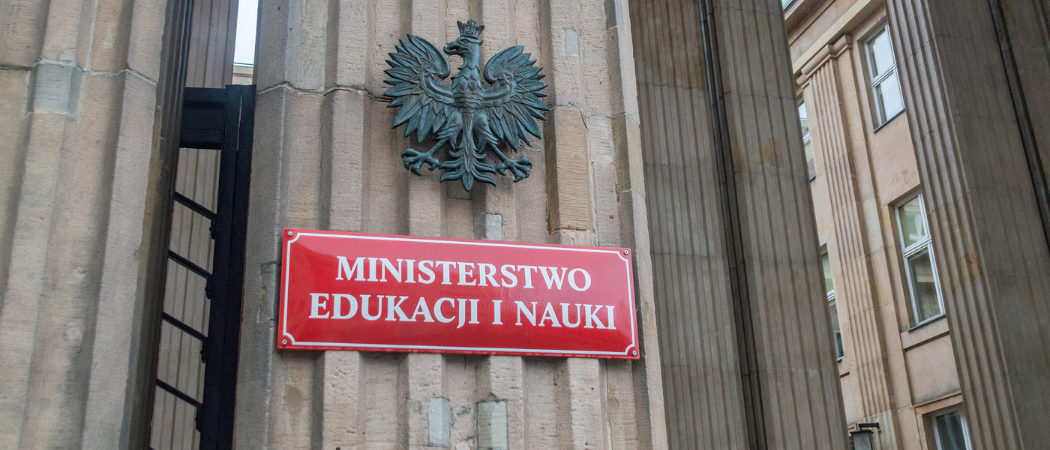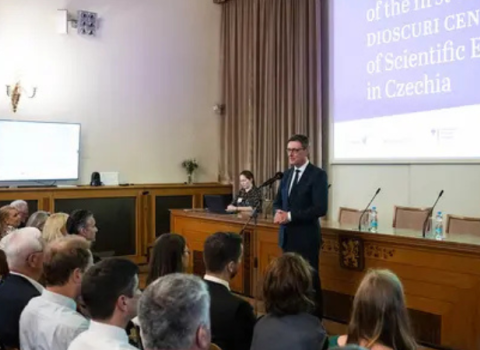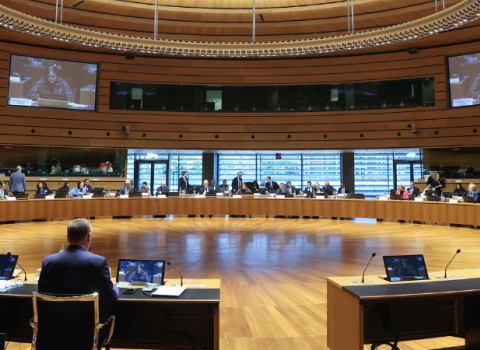Researchers hope splitting the Ministry of Education and Science will give higher priority to science and lead to increased financing for research

A sign marking the building housing the former Ministry of Education and Science, which has now been separated into the Ministry of Science and Higher Education and the Ministry of National Education.
Polish academics and scientists have welcomed the new government’s move to separate the Ministry of Education and Science into a Ministry of Science and Higher Education and a Ministry of National Education, saying that science had been “hidden in the shadow of education”.
The two new ministries were formally created in January. Dariusz Wieczorek, an electrical engineer, has assumed the role of the minister of science and higher education, while Barbara Nowacka, an IT specialist, is the minister of national education.
After the liberal Civic Platform won the election in 2023, the Polish Academy of Science (PAN) published a letter, advocating for the return to the two separate ministries, saying school education and scientific research have different financing and management mechanisms.
“Science and higher education are the foundation of Poland's successful development and should be overseen by separate ministries,” the letter said. The combination of the two ministries over the previous three years did not deliver the promised benefits. Instead, it had a detrimental effect, reducing the ability of the Polish education system to adapt to changes. The Conference of Rectors of Academic Schools in Poland (CRASP) also appealed for the establishment of a “strong separate ministry” equipped with the financial tools to develop scientific research.
PAN’s president-elect Marek Konarzewski told Science|Business that before the split, science in Poland “was lost even on a semantic level”. The previous head of the combined ministry Przemysław Czarnek was often referred to as minister of education, without mentioning his role in science. “Science, hidden in the shadow of education, has therefore often been seen as a less important part of the ministry and its activities, a kind of add-on to the core,” Konarszewski said.
In Konarszewski’s view, the establishment of the single ministry led to a perceived decline in the importance of scientific research and, as a result, a cut in expenditure. He believes that a return to two ministries will mean faster and easier access to funds for research.
In December, Wieczorek pledged to increase spending on science by PLN7 billion (€1.6 billion) compared to 2023, an increase of about 22%. He also promised to raise salaries for researchers by 30%. The Polish Academy of Sciences will also receive additional funding of PLN180 million.
In recent years, Poland’s R&D spending has remained significantly below the EU target of 3% and stood at 1.46% of GDP in 2022. The deputy minister, Marek Gzik, said increasing R&D investment to 2% of GDP would enable universities to retain young scientists who often leave to work in industry for higher salaries.
The director of Poland’s basic research funding agency, the National Science Centre, Krzysztof Jóźwiak said that the three year experiment merging management of the national school education system with higher education and research was unsuccessful. “The science sector was under-prioritised in many aspects,” he said. Poland faced a large drop in funding for research, as a result.
Uncertainty about the impact
While the combination of the two ministries does not seem to have worked in Poland, Germany has successfully operated with a single Ministry of Education and Research for almost 70 years. But, generally, according to Konarszewski, combining education and science within one ministry is more popular in the former Eastern Bloc countries, while creating separate ministries is common in western Europe.
Jóźwiak said researchers anticipate that the reinstated Ministry of Science and Higher Education, devoted to interest of universities, research institutions, and research-funding agencies, will have a positive impact on the sector. “We hope for an increased funding for all higher education and research players as it was significantly affected by the last year’s inflation, pandemics and political tension,” he said.
After the elections, former NCN director Zbigniew Błocki called for an increased budget for NCN, claiming the agency has not received enough money for years under the previous government, which even considered closing NCN. Jóźwiak told Science|Business that, although there are hopes NCN will now get more government funding, no details have been agreed so far.
Although researchers are generally in favour of the return to two ministries, there is still uncertainty about what the actual impact will be. “The emphasis should be placed much more on the plans and objectives for developing science inPoland, and the methods of their implementation, including financing, than on the ministry's name,” Justyna Chodkowska-Miszczuk, a professor at Nicolaus Copernicus University in Torun and NCN Council member, told Science|Business.
Adam Koprowski, spokesperson for the Jagiellonian University, said specialisation of ministries can contribute to better representation of the interests and needs of various groups: teachers, students, scientists, and educational and research institutions. However, he stressed the importance of collaboration between the ministries and other educational institutions to maximise the benefits of this change.
The University of Warsaw spokesperson Anna Stobiecka would not comment on the changes, saying the university is “an apolitical entity”. But she said the academic community is satisfied with the decision to establish the dedicated ministry for science and higher education.
The new Ministry of Science and Higher Education has not yet replied to a Science|Business request for comment.





 A unique international forum for public research organisations and companies to connect their external engagement with strategic interests around their R&D system.
A unique international forum for public research organisations and companies to connect their external engagement with strategic interests around their R&D system.